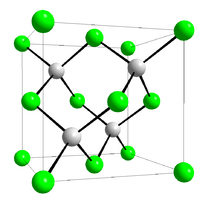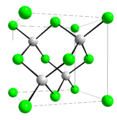Aluminium antimonide facts for kids
Quick facts for kids Aluminium antimonide |
|
|---|---|
 |
|
| Identifiers | |
| CAS number | |
| PubChem | |
| SMILES | [Al]#[Sb] |
|
InChI
InChI=1/Al.Sb/rAlSb/c1-2
|
|
| Properties | |
| Molecular formula | |
| Molar mass | 0 g mol-1 |
| Appearance | black crystals |
| Density | 4.26 g/cm3 |
| Melting point | |
| Boiling point | |
| insoluble | |
| Band gap | 1.58 eV |
| Refractive index (nD) | 3.3 |
| Structure | |
| Crystal structure | Zinc blende |
| Space group | T2d-F-43m |
| Coordination geometry |
Tetrahedral |
| Hazards | |
| MSDS | MSDS |
| NFPA 704 |
|
| Autoignition temperature |
590 °C |
| Except where noted otherwise, data are given for materials in their standard state (at 25 °C, 100 kPa) | |
Aluminium antimonide is a special kind of chemical compound. Its chemical formula is AlSb. This means it is made up of aluminium and antimony atoms joined together.
While other similar compounds, like gallium antimonide, are used to make LEDs and Infrared detectors, aluminium antimonide isn't as good for these main jobs. Instead, it plays a very important role. It helps improve how other compounds are made by stopping tiny flaws or "defects" from forming. This makes the other materials work much better.
Contents
What is Aluminium Antimonide?
Aluminium antimonide is a solid material that looks black. It is known as a semiconductor. This means it can conduct electricity under certain conditions, acting like a switch that can be turned on or off.
How it Reacts
Aluminium antimonide reacts with acids. When it mixes with an acid, it produces a gas called stibine. Stibine is a compound of antimony and hydrogen.
It also acts as a reducing agent. This means it helps other chemicals gain electrons during a chemical reaction. It has properties that are a mix between a salt and an alloy. A salt is usually formed from an acid and a base, while an alloy is a mix of metals.
Uses of Aluminium Antimonide
Even though it's not the main material for LEDs, aluminium antimonide is very important in making other advanced electronic materials. It helps create high-quality layers of other compounds. These layers are crucial for making efficient LEDs and infrared detectors.
By preventing defects, it ensures that the electronic devices made from these materials work reliably. This makes it a key ingredient in the world of modern electronics.
Related pages
Images for kids
See also
 In Spanish: Antimoniuro de aluminio para niños
In Spanish: Antimoniuro de aluminio para niños
 | Aurelia Browder |
 | Nannie Helen Burroughs |
 | Michelle Alexander |



